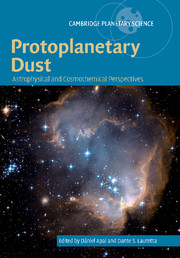Book contents
- Frontmatter
- Contents
- List of contributing authors
- Preface
- Acknowledgments
- 1 Planet formation and protoplanetary dust
- 2 The origins of protoplanetary dust and the formation of accretion disks
- 3 Evolution of protoplanetary disk structures
- 4 Chemical and isotopic evolution of the solar nebula and protoplanetary disks
- 5 Laboratory studies of simple dust analogs in astrophysical environments
- 6 Dust composition in protoplanetary disks
- 7 Dust particle size evolution
- 8 Thermal processing in protoplanetary nebulae
- 9 The clearing of protoplanetary disks and of the proto-solar nebula
- 10 Accretion of planetesimals and the formation of rocky planets
- Appendix 1 Common minerals in the Solar System
- Appendix 2 Mass spectrometry
- Appendix 3 Basics of light absorption and scattering theory
- Glossary
- Index
5 - Laboratory studies of simple dust analogs in astrophysical environments
Published online by Cambridge University Press: 24 February 2010
- Frontmatter
- Contents
- List of contributing authors
- Preface
- Acknowledgments
- 1 Planet formation and protoplanetary dust
- 2 The origins of protoplanetary dust and the formation of accretion disks
- 3 Evolution of protoplanetary disk structures
- 4 Chemical and isotopic evolution of the solar nebula and protoplanetary disks
- 5 Laboratory studies of simple dust analogs in astrophysical environments
- 6 Dust composition in protoplanetary disks
- 7 Dust particle size evolution
- 8 Thermal processing in protoplanetary nebulae
- 9 The clearing of protoplanetary disks and of the proto-solar nebula
- 10 Accretion of planetesimals and the formation of rocky planets
- Appendix 1 Common minerals in the Solar System
- Appendix 2 Mass spectrometry
- Appendix 3 Basics of light absorption and scattering theory
- Glossary
- Index
Summary
Abstract Laboratory techniques seek to understand and to place limits upon chemical and physical processes that occur in space. Dust can be modified by long-term exposure to high-energy cosmic rays, thus rendering crystalline material amorphous. It can be heated to high temperatures, thus making amorphous material crystalline. Dust may be coated by organic molecules, changing its spectral properties, or may act as a catalyst in the synthesis of both simple and complex molecules. We describe experimental studies to understand such processes and report studies that focus on the properties of simple oxide grains. We give an overview of the synthesis and characterization techniques most often utilized to study the properties of solids in the laboratory and have concentrated on those techniques that have been most useful for the interpretation of astrophysical data. We also discuss silicate catalysis as an important mechanism that may drive the formation of complex molecular compounds relevant for prebiotic chemistry.
Laboratory astrophysics is not an oxymoron. Laboratory studies are one of the very few means to understand the chemical and physical processes that occur in the outlandish environments (by terrestrial standards) observed by astronomers. Such processes often occur under conditions that are far removed from what is considered normal by most chemists and physicists, and the application of a terrestrially honed chemical intuition to processes in astrophysical systems is likely to yield incorrect interpretations of the observations unless the environmental effects are carefully considered. The design of experiments that address processes active in astrophysical environments must also account for differences between the laboratory and reality. Often one finds that it is neither necessary or even desirable to carry out experiments under typical astrophysical conditions.
- Type
- Chapter
- Information
- Protoplanetary DustAstrophysical and Cosmochemical Perspectives, pp. 128 - 160Publisher: Cambridge University PressPrint publication year: 2010
- 3
- Cited by



